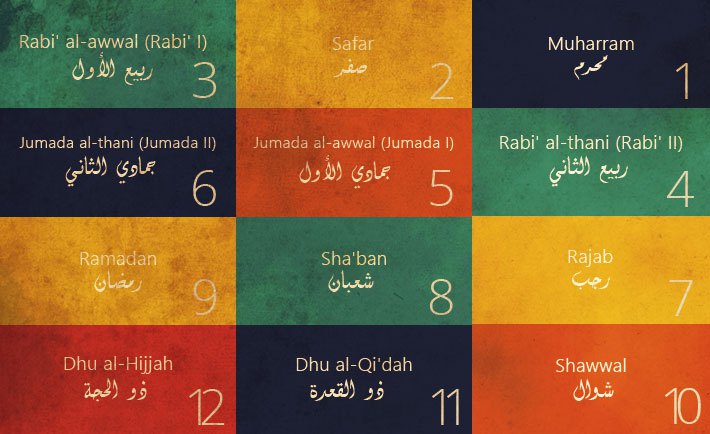


The Islamic calendar is a lunar one: months begin when the first crescent of a new moon is sighted. The first three days of the next month, Shawwal, are spent in celebration and are observed as the "Festival of Breaking Fast" or Eid al-Fitr. Therefore, Muhammad told his followers that the gates of Heaven would be open for the entire month and the gates of Hell ( Jahannam) would be closed. According to Islam, the Quran was sent down to the lowest heaven during this month, thus being prepared for gradual revelation by Jibreel to Muhammad. The month is spent by Muslims fasting during the daylight hours from dawn to sunset. The Shia community remembers the massacre on Ashura when Imam Hussain was said to be beheaded in the battle of Karbala and to mark public mourning and remembering the pain given to their great leader and his family, members of Shia community puts on black clothes, observe abstinence, fast and take out processions on this day.Ramadan ( Arabic: رَمَضَان, Ramaḍān) is the ninth month of the Islamic calendar, and the month in which the Quran is believed to be revealed to the Islamic prophet Muhammad.įasting during the month of Ramadan is one of the Five Pillars of Islam. The 10th day of the month or Ashura is mourned by Muslims in the remembrance of the martyrdom of Prophet Muhammad’s grandson, Hussain Ibn Ali, in Karbala. These are the traditional customs of Sunni Muslims. Wanting his followers to show the same gratitude to Allah, Prophet Muhammad decided to observe a two-day fast - one on the day of Ashura and the day prior that is the 9th and 10th day of Muharram. In 622 CE, when Prophet Muhammad migrated from Mecca to Medina in the month of Muharram, he learnt from the Jews that they fasted on this day following the ways of Prophet Musa. As a sign of gratitude to Allah, Prophet Musa fasted on this day that is the 10th of Muharram. It was in the month of Muharram that Allah saved the Children of Israel from Pharaoh. On the other hand, Shia Muslims refrain from attending and celebrating all joyous events in this period and observe the fast on the tenth day of Muharram, commemorating the martyrdom of Imam Hussain, who was the son of Hazrat Ali and the grandson of Prophet Muhammad, in Karbala. Observing a fast on this day is considered a ‘sunnah’ since Prophet Muhammad to kept a roza on this day after Prophet Musa or Moses as per the Sunni tradition. The word Muharram means ‘not permitted’ or ‘forbidden’ hence, Muslims are prohibited from taking part in activities like warfare and use it as a period of prayer and reflection. If the moon sighting committees declare that the crescent moon has not been sighted today, July 30 will be counted as the 30th day of Dhul Hijjah 1443 and the month of Muharram or the Islamic New Year 1444 AH will start from Sunday Jin India, Pakistan, Bangladesh, United Kingdom (UK), Singapore, Indonesia, Malaysia and Morocco. If the crescent is sighted, the first day of Muharram will be marked on Jin these countries. Friday 29th of Dhul Hijjah 1443 AH, after the maghrib prayers, corresponding to July 30, 2022. India, Pakistan, Bangladesh, United Kingdom (UK), Singapore, Indonesia, Malaysia and Morocco will be gearing up to sight the crescent moon of the Holy Month of Muharram this evening i.e. The Islamic New Year, also known as Al Hijri or Arabic New Year, is celebrated on the first day of Muharram as it was in this holy month that Prophet Muhammad migrated from Mecca to Medina but the 10th day of the month, known as Ashura, is mourned by Muslims in the remembrance of the martyrdom of Prophet Muhammad’s grandson, Hussain Ibn Ali in Karbala.Īs per the sighting of the cresent moon, Friday Jwill be the completion of the month of 30th of Dhul-Hijjah 1443 AH and the first day of Muharram 1444 will be on J(Saturday) in Saudi Arabia, Oman and other Gulf countries or those that follow KSA's moon sighting. Unlike the Gregorian calendar that consists of 365 days, Islamic calendar has about 354 days divided into 12 months. Muharram 2022: Al Hijri date, history, significance, rituals performed by Muslims on Islamic New Year (Twitter/syedadehlizahra)

After Ramadan or Ramzan, Muharram is considered to be the most sacred month in Islam and it marks the beginning of the lunar calendar which Islam follows. Muharram is the first month in Islamic lunar calendar, followed by the months of Safar, Rabi-al-Thani, Jumada al-Awwal, Jumada ath-Thaniyah, Rajab, Shaban, Ramadan, Shawwal, Zu al-Qadah and Zu al-Hijjah.


 0 kommentar(er)
0 kommentar(er)
